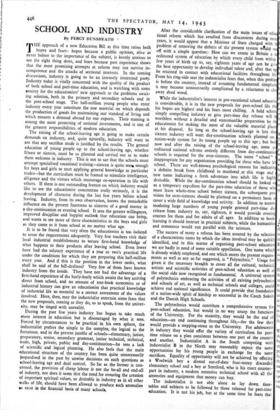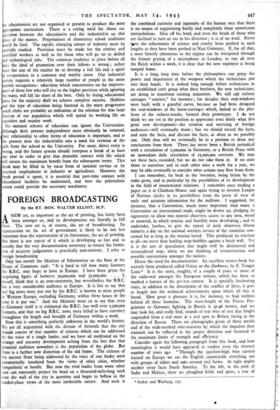SCHOOL AND INDUSTRY
By PERCY DUNSHEATH
THE approach of a new Education Bill at this time raises both hopes and fears: hopes because a public opinion, alive as never before to the importance of the subject, is keenly anxious to see the right thing done, and fears because past experience shows that the most promising attempts at reform may not survive in- competence and the attacks of sectional interests. In the coming discussions, industry is going to be an intensely interested party. Industry today is vitally concerned with the quality of the product of both school and part-time education, and is watching with some anxiety for the educationists' new approach to the problems await- ing solution, both in the primary and secondary schools and in the post-school stage. The half-million young people who enter industry every year constitute the raw material on which depends the production of goods for maintaining our standard of living and which ensures a demand abroad for our exports. Their training is among the most promising of national investments, and is one of the greatest responsibilities of modern education.
The raising of the school-leaving age is going to make certain demands on industry, and, quite naturally, industry will want to see that any sacrifice made is justified by the results. The general education of young people up to the school-leaving age, whether fifteen or sixteen, must be so planned and carried out as to make them welcome in industry. This is not to say that the schools must attempt specialised vocational training—sixteen is quite sooie enough for boys and girls to start applying general knowledge to particular trades—but the curriculum must be framed to stimulate intelligence, diligence and the virtues which encourage co-operation in life with others. If there is one outstanding feature on which industry would like to see the educationist concentrate really seriously, it is the development of character during the last few years before school leaving. Industry, from its own observation, knows the remarkable influence on the present fourteens to sixteens of a good master in a day-continuation or evening school. It sees the greater willingness, improved discipline and happier outlook that education can bring, and wants to see more of these characteristics in the boys and girls as they come to it front school at no matter what age.
It is to be feared that very often the educationist is too isolated to sense the requirements adequately. Very few teachers visit their local industrial establishments to secure first-hand knowledge of what happens to their products after leaving school. Even fewer have had the salutary experience of a year or two's practical life under the conditions for which they are preparing this half-million every year. And if this is the position in the lower ranks, what shall be said of the bill-drafters? Very few of them have known industry from the inside. They have not had the advantage of a first-hand experience of the hurly-burly which awaits the boy arriving direct from school, and no amount of text-book economics or of industrial history can give an educationist that practical knowledge of industrial life so essential to a correct assessment of the values involved. Here, then, may the industrialist entertain some fears that the new proposals, coming as they do, so to speak, from the univer- sity, may be tinged with unreality.
During the past few years industry has begun to take much more interest in education but is discouraged by what it sees. Forced by circumstances to be practical in his own sphere, the industrialist prefers the simple to the complex, the logical to the fortuitous, and in the present jumble of schools—elementary, junior, preparatory, senior, secondary grammar, junior technical, technical,
trade, high, private, public and day-continuation—he sees a lack
of scientific and logical planning. He also feels that the main educational structure of the country has been quite unnecessarily jeopardised in the past by unwise decisions on such questions as school-leaving age and dual control. So far as the former is con- cerned, the provision of cheap labour is not the be-all and end-all of industry, nor does it seem that the need for ensuring the creation of important spiritual values, so desirable in industry as in all other walks of life, should have been allowed to produce such anomalies as exist in the financial basis of many schools.
After the considerable clarification of the main issues of edu tional reform which has. resulted from discussions during recc years, it would appear that a Minister of State charged with t problem of removing the defects of the present system Auld sta off with a simple question: How can we create in Britain a c ordinated system of education by which every child from within few years of birth up to, say, eighteen years of age can be giy the best opportunity to develop individual talent and, after that ag be retained in contact with educational facilities throughout life From his ring-side seat the industrialist fears that, when this proble is before the country, instead of assuming fundamental simplici it may become unnecessarily complicated by a reluctance to cle away dead wood.
While the industrialist's interest in pre-vocational school educatio is considerable, it is in the new proposals for post-school life tha his hopes are highest and his fears most chilling. A bald schem simply compelling industry to give part-time day release will worthless without a detailed and statesmanlike preparation by th educationist for making the most of the valuable material place at his disposal. So long as the school-leaving age is less tha sixteen industry will want day-continuation schools planned on nation-wide system for its young people up to this age ; but bot now and after the raising of the school-leaving age, some c ordinated national scheme entirely different from day-continuatio schools is required for the over-sixteens. The name " school " ; inappropriate for Any organisation providing for those who have hi school. There are well-known psychological reasons for indicatin a definite break from childhood to manhood , at this stage and new name indicating a fresh adventure into adult life is high]. desirable. While the day-continuation school should be looked o as a temporary expedient for the part-time education of those wh must leave whole-time school before sixteen, the subsequent pro vision for over-sixteens should be plarined on a permanent basis t cover a wide field of knowledge and activity. In addition to accom modating large numbers of young people granted part-time das release from industry to, say, eighteen, it would provide evenin courses for them and for adults of all ages. In addition to book learning it should instruct in practical subjects, while the humanities and commerce would run parallel with the sciences.
1 ft
w bi
p bt
CC
sy
I
bl
The success of many a reform has been assured by the selection of a characteristic name by which the ideas involved may be quickly identified, and in this matter of organising post-school education we are badly in need of some suitable appellation. One' name which is already widely employed, and one which meets the present require- ments as well as any so far suggested, is " Polytechnic." Usage has given it the necessary breadth to cover all the cultural, technical, artistic and scientific activities of post-school education as well as the social side now recognised as fundamental. A universal system of polytechnics embracing the activities of all existing polytechnics and schools of art, as well as technical schools and colleges, could achieve real national significance. It could provide that foundation of a nation-wide spirit of kinship so successful in the .Czech Sokols and the Danish High Schools.
The polytechnics would constitute a comprehensive system for post-school education, but would in no way usurp the functions of the University. For the majority, they would be the end of education—an end continuing throughout life,—for the few they would provide a stepping-stone to the University. For adolescents in industry they would offer the variety of curriculum for part- time release on a plan consistent between one part of the country and another. Industrialist A in the South competing with industrialist B in the North may reasonably expect the same opportunities for his young people in exchange for the same sacrifices. Equality of opportunity will not be achieved by offering a Woolwich boy a dismal out-of-date four-storey discarded elementary school and a boy at Stretford, who is his exact counter- part in industry, a modern extensive technical school with all the amenities and equipment that money can buy.
The industrialist is not able alone to lay down time- tables and subjects to be followed by those released for part-time education. It is not his job, but at the same time he fears that
B
sc
51 fc
1- tl
h a
educationists are not organised at present to produce the most ppropriate curriculum. There is a crying need for closer co- peration between the educationist and the industrialist on this hase of the matter. Perpetuation of elementary school traditions %id be fatal. The rapidly changing nature of industry must be irefully studied. Provision must be made for the routine and skilled workers as well as for those who will go on to skilled d technological jobs. The common tendency to place before all ys the ideal of promotion over their fellows is wrong ; rather ust the aim of the teacher be to develop a full life and a spirit co-operation in a common and worthy cause. Our industrial ystem requires a relatively large number of people in the more umble occupations: education which concentrates on the improve- ent of those few who will rise to the higher positions while ignoring e many, will fall far short of the best. Only by laying educational ;Mans for the majority shall we achieve complete success. Hobbies nd the type of education being fostered in the more progressive youth clubs are probably an indication of the solution for that large fraction of our population which will spend its working life on epetitive and routine work.
No national scheme of education can ignore the Universities. 41though their present independence must obviously be retained, their relationship to other forms of education is important, and at the present time the industrialist sees a need for revision of the ath from the school to the University. For most, direct entry is wrong, and the future system should interpose a break of at least one year in order to give that desirable contact with life which will secure the maximum benefit from the subsequent terms. This break may be filled in by some form of national service or by practical employment in industry or agriculture. However the break period is spent, it is essential that part-time contact with educational facilities be maintained, and here the polytechnic ystem could provide the necessary machinery.



























 Previous page
Previous page